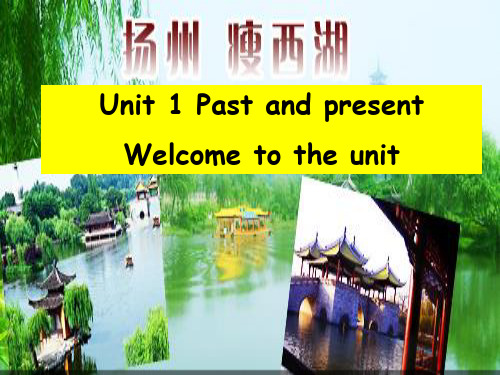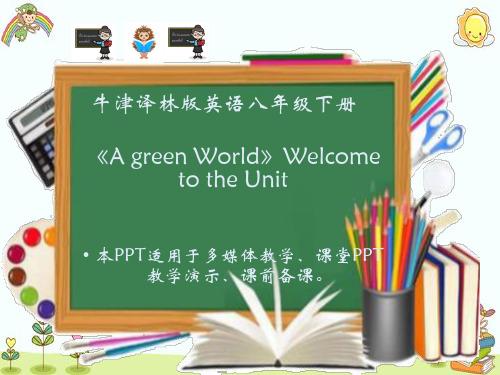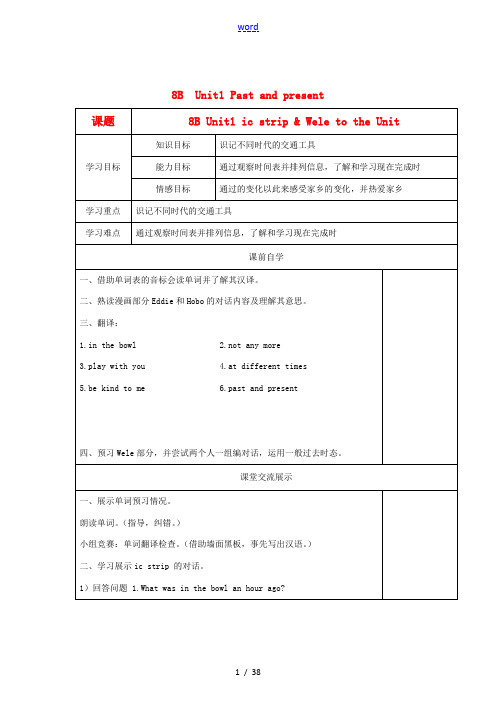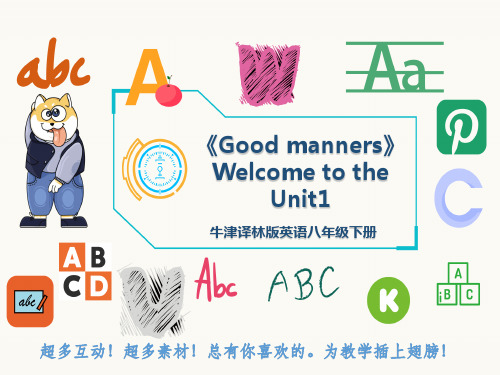牛津译林版八年级英语下册Unit 1 Welcome to the unit 示范公开课教案
江苏新教材牛津英语八年级下 Unit1 Past and present Welcome to the unit

Listen and answer
1. Does Hobo think Eddie has changed? Why? Yes. Because he used to share food with him.
Listen and answer
2. What was in the bowl an hour ago? Hobo’s food .
2. 技能目标: 1)了解北京不同时代的交通工具。 2)谈论自己、家人和朋友过去和现在使用的 不同交通工具。 3)初步认识现在完成时。 3. 情感目标:通过交通方式的变化,了解并 体会北京的巨大变化。
Lead-in
Happy New Year, boys and girls! We’re glad to be back at school again. You are one year older and you’re taller. All of you have changed.
Unit 1 Past and present Welcome to the unit
1.知识目标: 学习词汇:past , present, just 学习词组: used to do sth, Share sth with sb, go to school, by bike, take a bus 学习句子: You used to share food with me! It took a long time to wait for the next one.
Homework 1. Recite the sentences of the comic pictures. 2. 翻译下列词组 1)在碗中 2)过去常常 3)和……一起分享 4)家乡 5)在不同的时代 6)在过去的二十年中 7)北京的变化 8)一项历史项目
牛津译林版英语八年级下册《A green World》Welcome to the Unit

《A green World》Welcome to the Unit
• 本PPT适用于多媒体教学、课堂PPT 教学演示、课前备课。
学习目标:
1.能准确运用有关如何保护环境的表达。 2.能就环保的话题展开讨论。 3. 培养学生保护环境的意识。
Did you know that all around the world, 3 to 6 billion trees are cut down each year? Have you ever planted a tree?
The class 1, Grade 8 students are talking about ways to live a green life. Look at the pictures below and match them with the correct sentences.
a. We can reduce air pollution by riding bicycles.
turn off 关上(开关)
e.g. We can save energy by turning off the lights when we leave.
recycle vt. 回收利用,循环利用 e.g. We can protect the environment
by recycling things.
b. We can save water by taking shorter showers.
c. We can save energy by turning off the lights when we leave a room.
d. We can protect the environment by recycling waste.
英语Unit1PastandpresentComicPicturesWelcometotheunit教案(牛津英语八年级下)

Unit 1 Past and presentComic Pictures & Welcome to the unit本课时基本任务1.介绍本单元的主题:现在与过去2.学习不同时期有关交通工具的单词本课时必会单词:present, just, Light Rail, MTR, ferry, tram, since,本课时必会词组:an hour ago, be hungry, be kind, be so bad, want to do sth., play with sb., not…an y more本课时要了解的句型:1.It was in the bowl an hour ago.2.Because I was very hungry.3.You were kind.4.You always wanted to play with me.5.Have you seen my food?6.I’ve just eaten it.I. Lead-inTeacher says, ‘Hello, everybody! We haven’t seen each other f or a long time. Were you happy in winter holidays? Did you have a good time? What festival did you celebrate? Where did you go? What did you do? What did you eat? What food is your favourite?’II. Pre-taskTeacher says,‘My favourite food is chocolate. Because it smells nice and it tastes sweet and delicious, what’s more, it looks lovely and beautiful. Today I took a piece of chocolate here. I want to send it to someone clever. Oh, where is my chocolate? It was in my pocket an hour ago.’Teacher asks Ss,Have you seen my chocolate? --------No, I haven’t.Would you like to help me remember where it is?Ss guess Teacher saysMaybe you have put it in your bag. ---------No, I haven’t.Maybe you have put it in your book. ---------Yes, I have. How cleveryou are! I will send it to you.III. While-taskTask 1: Teacher asks,Do you still remember Hobo and Eddie?How are they this term?What are they talking about now?Let’s listen to the tape. (play the tape for the Ss to listen to the dialogue between Hobo and Eddie.) Task 2: Ask some questions about it:1. Where is Hobo’s food?2. Why did Eddie eat food?3. Is Hobo happy?4. What does Hobo think of Eddie?Task 3: Explain the important phrases and sentences in the dialogue.Phrasesan hour ago, be hungry, be kind, be so bad, want to do sth, play with sb., not…any more Sentences1. It was in the bowl an hour ago .2. Because I was very hungry.3. You were kind.4. You always wanted to play with me.5. Have you seen my food?6. I’ve just eaten it.7. You’ve eaten my food.Task 4: Work in pairs and drill the dialogue.Task 5: Ask some Ss to act the dialogue out, then do the exercise.Hobo’s food _______ in the _______ an hour ago. But it isn’t there now. Why? Eddie has just _______ it because he is ________. Hobo thinks Eddie has _______ and he is _______ bad now. He doesn’t w ant to _______ with Eddie any ________.Task 6: Teacher asks,Eddie and Hobo both think they have changed a lot. There are also many changes in our life. How did you come to school today?Do you know other different forms of transport?Task 7: Welcome to the unit.Show some pictures of the the different forms of transport.Ask the Ss to fill in the blanks with the correct names. Then check the answers.Task 8Read the following sentences and ask the students to guess which mode of transport you are describing.1. It has traveled across Victoria Harbour, between Hong Kong Island and Kowloon since1898. (ferry)2. It’s an easy way to get to the op of the peak. (peak tram)3.There are many of them. Each one has wheels and takes you to many places in and aroundHong Kong. (bus)4. It has provided transport service for people living in the north-west New Territories since1988. (light rail)5. It is the fastest way of traveling and was introduced to Hong Kong in 1925. (plane)6. Thousands of people travel to work on it every day. (underground)IV. Post-task1. Talk about the transport at different times in Hong Kong using the sentence:There has been … since ….2. Read the context of Part A and expand on it to create interest. Link it to personal experiences and talk about the usefulness, convenience and efficiency of different modes of travel. V. Homework1. Recite the sentences of the comic pictures.2. 翻译下列词组在碗中不再和……一起玩家乡学习更多的在过去的二十年中香港的变化一项历史计划上列词组的正确形式填空1) __________, the transportation has changed a lot in Nanjing.2) I did badly in my test. Now I ____ play computer games _____.3) Could you tell me some ________________?4) Lily is making ______ on the changes on her ___________?5) Jim likes to __ Ann. They have the same hobby of playing chess.6) Kitty likes traveling. She wants _________ the geography.7) Can you tell me where my food is? It’s _________.3. 你知道南京交通工具的演变过程吗?你能说出多少呢?第三—四课时Reading本课时基本任务1. 阅读关于九龙岛的变迁。
2023年牛津译林版八年级英语下册《Unit 1 Welcome to the unit》学案

《Unit 1 Welcome to the unit》学案【学习目标】1. 识记北京不同时代的交通工具。
2. 谈论自己、家人和朋友过去和现在使用的不同交通工具。
3. 初步认识现在完成时。
教师个备或学生笔记【课前预习】短语翻译1.一小时前________________2.你见过我的食物吗_______________________3.我刚刚吃了它_______________4.步行去那儿______________/__________5.太多人和车辆_______________6.过去常常对我好__________________7.你已经变了____________________8.在过去_______________9.过去常常和我分享一切__________________10.现在_______________11.在不同的时代________________________12.他的过去和现在_______________13.等下一班公交_______________________14.打的环游这个城市________________ 15.乘大客车去北京______________/__________________/________________【学习过程】Step1: Lead ina. Revise:bus, taxi, train, plane, underground.(1) How do you go to school every day?(2) How do your parents go to work every day?(3)If I want to go to the USA, How can I get there?(4) How did you go to primary school? How did I go to school? (used to do...)b.guessing game1. It is a comfortable bus for carrying people over a long way.2. It has many stops to let people to get on and off, but doesn’t cost you much.3. It’s the fastest way of travelling to a place far away, but costs much. etc.Step2: Welcome to the unitA.Transport at different time in BeijingB.Liste n and answer: How did Millie’s father go to school when he was a student?Why didn’t he take a bus to school?How did Millie go to school ? Why?Step3: Comic stripListen and answer:1. What was in the bowl an hour ago?2. Why did Eddie eat Hobo’s food?Ask:Does Hobo think Eddie has changed? Why? (used to ....)Does Eddie think Hobo has changed? Why?Read and actStep 4 : Homework【当堂训练】一、根据句意和首字母提示完成下列句子:1.At p_______,we can fly to Seoul from Shanghai.2.We can't forget the poor life in the p_______.3.I've_______(刚刚)known about it. Sorry to hear that.4.He has changed. He u_______to be so kind to his wife.5.In big cities, people often go to work by u_______.It's fast and cheap.6.As t________ change, fashion changes, too.7.—Have you e_______ your lunch? ---Yes, I ate some rice and chicken.8.They have a_______finished their work, so they go home by c_________=on c_______.9.They arrived in Beijing on May Day. The n_______ afternoon they visited the Great Wall.10. Do you know the c_______ to Danyang in the past ten years?【课后提升】一、用所给词的正确形式填空:1. --Where’s my food? -- I ____________ just ____________ (eat) it.2.-- Look! Who ____________ (clean) the room ? -- Jim and his friends ______.3. -How often __________ Millie with her parents __________ (go) shopping? --Once a month.4. The meeting ________________ (begin) in half an ho ur.5. --Where ________ (be) Jim? --He _________(water) the flowers over there.6. --____________ you __________(see) my bike? -- No, I haven’t.7.They don’t want _____Maths because it’s too hard, but nothing can prevent me ____ it. (learn)8. There are some great ________in Nanjing. It __________ a lot.(change)9. He _____________ (not do) his homework on Fridays.10. They ___________ (watch) the football game at ten o’clock yesterday.11. You may let her _____________ (go) back home now.12. We enjoy _______________ (read) after class.13. It’s nice ____________ (meet) you here after a long time.14. In the past, she ___________ (not like) English, but now she ________.15.I don’t want to see the film, because I _____________(see) it already.16.You ______________(change).You________(be) kind. , but now you are so bad.17.We _______just_________(visit) the museum, it’s very interesting.18.--_______they __________the house at that moment? --Yes,they ______. (clean)19. Welcome to my party. Just help ___________(you) to the food and drink,children20. It is __________(healthy) to eat too much fat food.21. _________(luck), he passed the exam, but Lucy _______.22. It is ___________(polite)________(ask) a woman how old she is.23. Mum, How _______ you _______(go) to school when you ______(be) a student?24. _________(travel) by bus _______(seem) to be easy and fast.25.-Why____Tom _____(not drive) to work this morning?–Because his car_____(break) down.二、选择题:( ) 1.—It’s nice to see you again.Have you changed your job?--No._______ my cousin here.A.I’m going to visitB.I’m visitingC.I visitedD.I had visited( ) 2. We got here____________ half an hour ago.A. sinceB./C. forD. in( ) 3. He walked _____ me and stopped to talk to me.A.passB.pastC.passedD.passing( ) 4.The building is a cinema now. It____________a supermarket.A. was used to beB. used to beC. is used to beingD. uses to be( ) 5. I am _______ my dictionary,but I can’t ________ it.A.look,findB.look for,findC.looking for,findD.looked,found( ) 6. –Mark speaks English well,but you _______ him. – Thank you.A.speak as badly asB.speak worse thanC.don’t speak as badly asD.speak much better than( ) 7. --Why _______ you join in the activity?---Since I was too busy.A. don’tB. notC. didD. didn’t( ) 8. In fact, _____ he is, ______ he feels.A. busy, happyB. busier, happierC. the busier, happierD. the busier, the happier ( ) 9.There is no ______ things on the moon.A. aliveB.livingC. lively D life( ) 10. What do you think ___ her _____? She is making a paper plane _______.A. make, sad, sadB. makes, sadly, sadC. makes, sad, sadly,D. make, sadly, sadly( ) 11. We were watching TV _____ he came in.A. whenB. whileC. howD. what( ) 12.一__________he __________at this school two years ago? 一一Yes,I think so.A. Did ; studyB. Has, studiedC. Was; studyD. Did; s tudied( ) 13.一China develops so fast.一That’s true. It____________a lot already.A. has changedB. changedC. will changeD. changes( ) 14.--_____ you ______ the film? –Yes, I _______it three months ago.A. Did,see,sawB. Have, seen, have seenC. Have ,seen, sawD. Did, see, have seen ( ) 15.Kate used to teach in a primary school, but now she ________.A. didn’tB. isn’tC. doesD. doesn’t三、翻译句子:1.我妈妈一小时前在家里.___________________________________________2.--你看见我的电脑了吗?-- 我没有_________________________________________3.格林先生每天乘公共汽车去上班.________________________________/____________________________________4.许多年前凯特曾经是一名护士,但现在不是了。
八年级英语下册 Unit1精品教学案(共10课时) 牛津译林版

8B Unit1 Past and present8B Units1导学案参考答案Unit1第一课时:一、1.was 2.has eaten 3.to have 4.to play 5.is eating 6.took 7.rode8.will be二、1.would like , grows up 2.walks to school 3.goes to work by bus 4.flies to5.don’t want to any more第二课时:一、1.know about 2.get married 3.move out 4.water pollution 5.in the centreof6.feel lonely7.turn into8.from time to timeed to do 10.in some ways二、well has lived southern got married in the centre of children has changed a lotmarket stallsHas turned into to play cards pleasant shoe factory waste waterfish and plants polluted took action cleaner in some ways open space lonely第三课时:一、1. I don’t want to play with you any more.2.There used to be the home of birds.3.He live in Beijing since he moved here.4.In the past ,many people had no money to go to school.5.Nanjing has changed a lot in the past five years.6.Many friends have moved to other places ,so I feel lonely from time to time.7.I had an interview with my Chinese teacher this morning.8.It has bee more difficult to play chess with my old friends.二、1.Where have they gone ..2.How long has lived3.When was born4.you helping me第四课时:一、1.dishonest 2.unhappy 3.unlucky 4.impolite 5.unkind二、D C C B C A三、1.cheaper 2.healthiest 3.impossible 4.safely 5.well better第五课时:一、1.They haven’t read the book yet.Have they read the book yet? Yes, they have/ No , they haven’t1.How long has Daniel stayed in Shanghai?2. I have known him for ten years.3.Sandy has been in Beijing for half an hour.二、1. Have seen have did see2.lent hasn’t given 3.have been did visit第六课时:一、C C A A D B二、1. He has already finished homework.2.Have you ever been to Beijing?3.I have known Linda for 3years.4. I have just seen Lily.5.We haven’t heard from him for a long time.第七课时:一、1.is 2.do 3.will be 4.shall go 5.taught 6.has taught 7.has gone8.Have seen 9.have learned 10.will arrive二、1.How long have you known him?2.Has Jane finished her homework?3.I haven’t worked in this school for two years.4.Why hasn’t Jim finishedhis homework?5.when did you buy this watch?6.Who is the old man next to Lily?7.Which girl is my sister?8.How far is your home from your school?第八课时:一、1.advantages 2.reduce 3.changed 4.developments 5.service6.interview7.realizes 9.repair二、1.recently 2.unpleasant 3.impolite 4.have done 5.left6.southern7.polluted8.Has arrived arrived9.has eaten 10.have been第九课时:第十课时:一、1.as often as before 2. have an interview with sb ed to do sth 4.so big and modern5.in the north of二、1. was has lived 2.was made 3.Has arrived arrived 4.has eaten5.safely6.has been7.have been三、1.B 2.C 3.B 4.C 5.D 6.A四、1.Have you anything 2.doesn’t provide any longer 3.since ago ed to5.has been to。
牛津译林版英语八年级下册《Good manners》Welcome to the Unit1

He wants to eat Hobo’s cake.
• Eddie: You’re old enough to learn about manners, Hobo.
• Hobo: Eh? What do you mean?
should learn aabnogurtymanners too.
Discussion
May day is coming. What should you do and should not do when you go travelling?
• Have a summary(总结)about good manners you have known.
litter [‘lɪtə] n.[U]垃圾,杂物
Doing the right things in the public places. Can you cross the road like this way?
We should obey traffic rules. /ə’bei/ 遵守,顺从
_d_r_o_p_ _li_t_te_r_ everywhere
_w_r_i_te_ in the books
Manners in different places. A: Can we …? B: No , we can’t. We should…. A: Can we…? B: Yes, …
……
《Good manners》 Welcome to the Unit1
牛津译林版英语八年级下册
超多互动!超多素材!总有你喜欢的。为教学插上翅膀!
Do you have good manners?
牛津译林版八年级英语下册8B U1 随堂练习和巩固练习(附答案)

8B U1 随堂练习Welcome to the unit随堂练习1. _______2. _______3. _______4. _______5._______ B.单项选择。
( )1. -_______ is my bike? It was under the tree five minutes ago.A. HowB. WhatC. WhereD. How long( )2. - Why don't you want to see the dolphin show?- Because I_______ it before.A. seeB. sawC. will seeD. have seen( )3. - Have you just_______ an apple? - Yes, I have.A. eatB. eatsC. ateD. eaten( )4. I_______ eat snacks before.A. am used toB. used toC. use toD. using to( )5. I was tired_______ I walked a long way.A. so .B. becauseC. butD. howeverC.汉译英。
1.你看到我的英语书了吗?_______ you _______my English book?2.我迟到是因为我起床太迟了。
I was late_______ I________ ______too late.3.我常和他合打一把伞。
I often _______one_______ _______him.4.你能告诉我北京在过去一百年中的变化吗?Can you tell me the_______ in Beijing_______ _______ _______ _______ years? 5.在英语课上我过去常说汉语,但现在我习惯于说英语了。
Unit 1 第 1 课时-八年级英语下册同步课时练习题(牛津译林版,含答案)

八年级英语下册同步课时练习题(牛津译林版)Unit 1 Past and present第1课时comic strip & Welcome to the unit一、完成句子1.他感到很担心,他似乎还没有习惯在公开场合演讲。
He feels worried. It seems that he ________ ________ ________ ________ speaking in public.2.我们学校这些年发生巨大的变化。
_______________________________________________________________________________ __ in our school.3.当地人过去住在旧房子里,但是现在,他们中大部分已经搬进了新大楼。
Local people__________________________,but now, most ofthem_________________________.4.我们应当习惯公交出行。
We should_______________________by public transport.5.过去,人们只能骑自行车或步行来往于集镇。
_________________, people_____________by bicycle or on foot.题组A 能力提升练二、完型填空In many big cities, there are usually more than one underground line(地铁线). The fastest way ____6____ in a city is by subway. Do you know how to travel by subway? Here is some information ____7____ before you travel by subway. First, you should ____8____ the right line. If you don't, you will have to ____9____ and take another one. Second, you need some coins____10____ your ticket, because ____11____ the machines which sell tickets only accept coins. Coins can be changed next to the ticket machines. Or you can go to the ticket office ____12____ some. ____13____ you have a prepaid card, you can just go ahead. After you have bought the____14____ , you should wait for your subway outside the yellow line. You ____15____ walk too close to the yellow line. It's dangerous.6.A.traveling B.to travel C.traveled D./7.A.to know B.to find C.to see D.to take 8.A.plan B.draw C.discuss D.choose 9.A.get up B.go down C.get off D.get on10.A.of B.to C.for D.in11.A.most of B.some of C.one of D.a bit of 12.A.to buy B.to get C.to borrow D.to change 13.A.Where B.If C.What D.Why 14.A.coin B.train C.everything D.ticket 15.A.should B.needn't C.must not D.must三、阅读单选AFor most people, the word “fashion” means “clothes”. So people may ask the question, “What clothes are in fashion?” And they use the adjective(形容词) “fashionable” in the same way, “She was wearing a fashionable color.” But of course there are fashions in many things, not only in clothes. There are fashions in holidays, in restaurants, in films and in books. There are even fashions in school subjects, jobs and languages.Fashions change as time goes. If you look at pictures of people or things from the past, you will see that fashions have always changed. An Englishman in 1750 looked different from his grandson in 1860. Today fashions change very quickly. Some of these are natural. We hear about things much more quickly than ones in the past. Newspapers, radios, telephones, televisions, and computers send information from one country to another in a few hours. New fashions mean that people will buy new things, so you see there is also money in fashion.16.From this passage we know that “fashion” means ________.A.clothes B.many thingsC.most of the popular things D.everything17.Today fashions change very quickly because ________.A.people read newspapers every dayB.radios send information from one country to anotherC.new things that people like are often shown on TVD.people quickly learn what is happening in the world18.From the passage, we know fashions change ________.A.as places change B.as people change C.as time goes D.as information goes 19.“There is also money in fashion” means ________.A.fashionable things are expensive B.money comes from fashionC.people like new things D.there are no fashions without money 20.According to the passage, which sentence is NOT true?A.Fashion just means clothes.B.There are fashions in many things.C.An Englishman in 1750 was not the same as his grandson in 1860.D.New fashions mean that people will buy new things.BOur school is No 1 Middle School. It is not big, and it has a short history, but I’m lucky that I am a student of this school.Ten years ago, there were not any teaching buildings and not a library in our school. The playground was so small that we could only play basketball there.Now great changes have taken place in our school in the past ten years. There are three modern teaching buildings and there four modern computer classrooms. We have computer studies every week. On the left side of the school stands a modern lab building. On the right side of the school there is also a modern building—the library. In the library there are 20 thousand books and magazines. We can go to the library to borrow books and magazines at any time. We have built a new playground. It is much bigger than before. We can play not only basketball but also footballand many other sports there. There are a lot of flowers, grasses and trees in and around our school. We usually take a walk or chat with our classmates after lunch and supper between the flowers and trees. We always feel very happy.In a word, our school is more and more beautiful and modern. We love our school.21.The school looks like ________.A.not big but modern and beautifulB.big, modern and beautifulC.very small but modern and beautifulD.not big but modern and beautiful with a long history22.Could the students borrow the books from the library ten years ago?________A.Yes, they could.B.It’s impossible because there is not library.C.I’m not sure.D.Certainly.23.There are ________ buildings in the school.A.four B.three C.seven D.five24.The students can borrow the library books ________.A.on weekdays B.on SaturdaysC.at weekends D.A and C25.We can find the students ________ after lunch in No 1 Middle School.A.in the reading roomB.in the dining roomC.between the trees and the flowersD.in the shop.题组B 培优拔尖练26.He used ________ in a town, so he ________ everything in the new town very soon.A.to live, got used to B.live, used toC.to living, got used to D.to live, used to27.Jack used to ________ shy but now he is used to ________ with others.A.be; talk B.be; talking C.being; talk D.being; talking 28.Miss Li used to ________ to work, but now she gets used to ________ to work. A.drive; ride B.drive; riding C.driving; ride D.driving; riding 29.—Have you finished your homework ________, Jane?—Yes, I've finished it ________.A.already; yet B.yet; already C.yet; yet D.already; already30.When you feel helpless and_________, just remember that you are not _________ in the world because your friends are around you.A.alone; alone B.alone; lonely C.lonely; alone D.lonely; lonely参考答案一、完成句子1.他感到很担心,他似乎还没有习惯在公开场合演讲。
- 1、下载文档前请自行甄别文档内容的完整性,平台不提供额外的编辑、内容补充、找答案等附加服务。
- 2、"仅部分预览"的文档,不可在线预览部分如存在完整性等问题,可反馈申请退款(可完整预览的文档不适用该条件!)。
- 3、如文档侵犯您的权益,请联系客服反馈,我们会尽快为您处理(人工客服工作时间:9:00-18:30)。
教学活动
13. Students work in groups and fill in the form.
14. Students do reports.
活动层次
应用实践之内化与运用
迁移创新之想象与创造
效果评价
通过观察学生的活动反馈,了解学生在实际生活中运用目标语言的能力。
3. Students have a free talk.
4. Students look at the pictures andmatch.
活动层次
学习理解之感知与注意、获取与梳理
效果评价
通过观察学生活动的反馈,了解学生对不同交通方式的掌握情况。
环节设计意图:通过讨论及匹配活动,学习不同交通方式的正确表达,加深学生对目标语言的理解,同时为后面的听力活动做铺垫。
7. Students read and circle the right sentences.
活动层次
学习理解之获取与梳理
应用实践之分析与判断
效果评价
通过聆听学生所填信息,了解学生对语料信息的理解程度。
通过观察学生的活动反馈,了解学生对语言框架的搭建情况。
教学活动
8. Students make new conversations.
教学活动
9.Students look at the picture and talk.
10. Students watch the video and answer the questions.
11. Students listen and fill in the blanks.
12.Students role-play the conversation.
四、教学重难点
【重点】
1.掌握北京不同时代的交通工具的表达方式;
2.谈论自己及他人过去和现在使用的不同交通工具。
【难点】
1.掌握北京不同时代的交通工具的表达方式;
2.谈论自己及他人过去和现在使用的不同交通工具。
五、教学活动设计
环节一:话题导入,激活已知(4 mins)
教师引导学生玩猜谜游戏。
教学活动
活动层次
应用实践之内化与
运用
效果评价
通过观察学生的对话表现情况,了解学生对目标语言的内化与运用情况。
环节设计意图:培养学生提取关键信息的能力,同时搭建语言框架,口头输出,锻炼学生的口语表达能力。
环节四:在新的语境中,获取有关“变化”的信息。(13 mins)
教师引导学生看漫画回答问题并进行角色扮演。
环节设计意图:培养学生将所学知识运用到实际生活中的能力。
作业与拓展
1. What other changes have happened to your family? Talk about the changes with your parents and take notes.
2. PreviewReading.
活动层次
学习理解之感知与注意、获取与梳理
应用实践之内化与运用、分析与判断
效果评价
通过观察学生的信息提取反馈,了解学生对视频信息的获取和理解程度。
通过观察学生能否准确使用语言进行角色扮演,把握其对漫画内容的理解程度。
环节设计意图:培养学生提取关键信息的能力。
环节五:联系生活实际,谈论自己及家人出行方式的变化(10mins)
二、学情分析
八年级的学生对生活中常见的交通方式比较熟悉,学生乐于谈论,也有话可谈。但是对于如何对比过去与现在的交通方式存在困难。
三、教学目标
通过本课时的学习,学生能够:
1.掌握北京不同时代的交通工具的表达方式;
2.谈论自己及他人过去和现在使用的不同交通工具;
3.初步感知交通方式的变革对人们生活的影响。
1. Studentsread and guess.
活动层次
学习理解之感知与注意
效果评价
通过观察学生的反馈,了解学生已知。
环节设计意图:引起学生学习兴趣,激活已知,引出主题。
环节二:创设情景,学习不同交通方式的正确表达(5 mins)
通过一系列活动,引导学生学习不同交通方式的正确表达。
教学活动
2.Studentsthink and answer the questions.
Unit 1 Past and present
Period 1 Comic strip & Welcome to the unit
一p和Welcome to the unit。学生通过漫画以及小对话的形式,了解交通方式的变化,初步感知“家乡与社会的变迁”的单元主题。
环节三:听录音获取信息,读对话搭建语言框架(13 mins)
通过听录音和读对话以及对话练习的活动,获取信息,并搭建语言输出框架。
教学活动
5. Students listen to the conversation andfill in the form.
6. Students complete the conversation according to the context.
